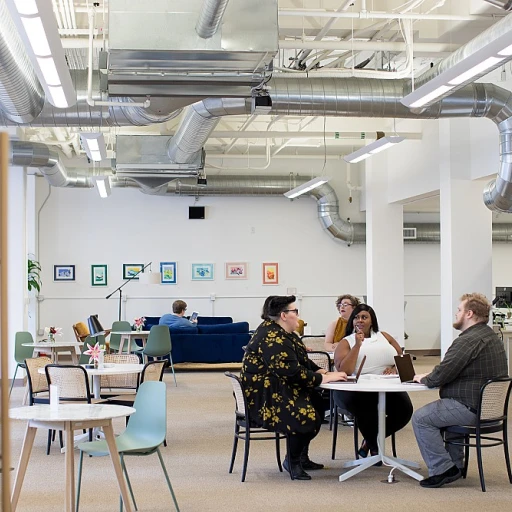
Understanding the Role of Job Fairs
Job Fairs: Bridging Candidates and Employers
Job fairs have long been an integral part of the recruitment landscape, serving as a dynamic platform where job seekers and potential employers can connect directly. These events bring together a diverse array of opportunities, facilitating a unique meeting ground that effectively bridges the gap between candidates and companies across various sectors. In the context of a job search, fairs are pivotal in providing direct access to employment opportunities that might not be readily available through traditional means or online applications. Although many employers offer application processes that can be completed online, attending job fairs allows for face-to-face interactions, which can significantly increase the likelihood of job seekers making a memorable impression on potential employers. For many individuals, job fairs are worth the time invested because they present a chance to gain firsthand insights into company culture and expectations. The attendance at these events is often quite diverse, encompassing everyone from entry-level job seekers looking for their first career break to mid-career professionals seeking new challenges. Career fairs can vary greatly in size and scope, from large conventions hosting hundreds of companies to specialized gatherings tailored to specific industries or sectors. However, what remains consistent is their role in facilitating personal connections and helping candidates tailor their job search strategies more effectively. Moreover, the value of job fairs extends beyond simply finding job openings. They serve as a vital educational resource, offering workshops and presentations that can enhance a job seeker's prospects by providing industry insights and career advancement tips. For those interested in exploring career opportunities at a dynamic, industry-leading organization, visiting the career fair environment can be particularly rewarding. Such interactions can lead to a deeper understanding of what different employers value, informing long-term career decisions and enhancing the overall job search experience.Benefits of Attending Job Fairs
Advantages of Participating in Career Expositions
Attending job fairs offers numerous benefits to job seekers, making them a valuable component in the job search journey. Here are some reasons why job fairs can be worth your time and effort:- Direct Interaction with Employers: Job fairs provide a unique opportunity for individuals to engage face-to-face with potential employers. This personal interaction allows candidates to make a memorable first impression, ask questions about the company culture, and gather valuable insights that go beyond what is available online.
- Immediate Access to Multiple Job Opportunities: At a career fair, job seekers can explore a wide array of job openings across different sectors. This concentration of job opportunities in one place allows for efficient comparison and prioritization, especially for individuals looking to enter the employment market or switch careers.
- Networking Chances: Job fairs serve as a networking hub where attendees can connect not only with employers but also with other job seekers, career counselors, and industry professionals. These connections can be instrumental in learning about hidden job markets and gaining references for future opportunities.
- Insight into Market Trends: Engaging with various employers at job fairs offers a snapshot of what sectors are currently hiring, what skills are in demand, and what the overarching market trends are. This information can guide job seekers in tailoring their skills and resumes to better fit market needs.
- Enhanced Job Search Skills: Participating in job fairs can sharpen communication and presentation skills, as individuals practice pitching themselves to employers. This real-world experience can increase the likelihood job seekers will succeed in the application process, whether online or in person job interviews.
Challenges Faced by Candidates at Job Fairs
Hurdles Candidates Face at Job Fairs
The bustling environment of job fairs can present numerous challenges for candidates. While job fairs are pivotal in connecting job seekers with potential employers, they are not without their difficulties. Here are some common obstacles that individuals may face:- Overwhelming Attendance: The sheer number of attendees can be daunting. Large crowds at job fairs can lead to long waiting times, making it hard for job seekers to get the attention they need from employers. This can also impact interaction quality, making it difficult to leave a lasting impression.
- Limited Time to Impress: With each conversation, there is limited time to make an impact. Each interaction must be concise yet impactful, which can add pressure on job seekers, especially if they are not well-prepared.
- Lack of Personalized Feedback: Candidates often leave career fairs without valuable feedback. The fast-paced nature of these events means that detailed feedback on resumes or interviews is rarely provided. This leaves job seekers unsure about what areas of their job search need improvement.
- Competing Job Seekers: With so many candidates attending, there is significant competition. This can be particularly challenging for those entering a highly competitive job market, as the likelihood of standing out is reduced.
- Navigating Company Cultures: Understanding the company culture of various employers in a short span is challenging. Opportunities for gauging whether a company is a long-term fit are limited, unlike when candidates can research companies extensively online or during in-depth interviews.
Comparing Job Fairs to Other Recruitment Channels
Job Fairs vs. Online Applications
In the modern job market, job seekers have a plethora of options when it comes to finding employment opportunities. Job fairs and online applications are two prominent channels, each with its own set of advantages and challenges. Understanding these differences can help individuals make informed decisions about where to invest their time and effort.
Face-to-Face Interactions
One of the most significant benefits of attending job fairs is the opportunity for face-to-face interactions with potential employers. This personal connection can provide job seekers with insights into company culture and the work environment that are often not available through online platforms. In contrast, applying online can sometimes feel impersonal, as it lacks the immediate feedback and personal touch that a career fair offers.
Time Investment
While job fairs require a significant time investment, they offer the chance to meet multiple employers in a single day. This can be more efficient than applying to jobs online, where the application process can be lengthy and often involves waiting for responses. However, for those who cannot attend in person, online applications provide the flexibility to apply at any time, making them a convenient option for many job seekers.
Exploring Opportunities Across Sectors
Job fairs often cater to specific sectors, allowing job seekers to focus their search and increase the likelihood of finding relevant job openings. This targeted approach can be beneficial for individuals looking to enter a particular industry. On the other hand, online platforms offer a broader range of opportunities across various sectors, which can be advantageous for those open to exploring different career paths.
Privacy and User Agreements
Privacy is another consideration when comparing these two channels. Attending job fairs involves sharing personal information in a public setting, whereas online applications require job seekers to agree to privacy policies and user agreements. Understanding these terms is crucial to ensure that personal data is handled appropriately.
Ultimately, the choice between job fairs and online applications depends on individual preferences and circumstances. Both channels have their merits, and job seekers may find that a combination of the two provides the best chance of success in their job search.
Tips for Maximizing Job Fair Experience
Making the Most out of Your Job Fair Experience
Attending career fairs can be a pivotal step in a job search if done correctly. Whether you are a newcomer to the job market or an experienced professional, preparation is key to maximizing your time at these events. Here are some essential tips to enhance your experience:- Research Potential Employers: Prior to attendance, gather information about the companies scheduled to be present. This knowledge not only helps tailor your conversation but also makes you a well-informed candidate, increasing your likelihood of impressing potential employers.
- Prepare Your Elevator Pitch: Develop a concise, impactful summary of your skills, experience, and career aspirations. This pitch is your first impression, so ensure it captures your professional strengths and aligns with potential job openings.
- Be Strategic with Booth Visits: Prioritize which employers and sectors align with your career goals. Spending quality time at relevant booths over a quantity approach will better position you in the eyes of attending companies.
- Dress Professionally: First impressions count, and professional attire can often convey your seriousness about the opportunities. Consider the company culture and sector when deciding on your attire’s formality level.
- Follow Up Appropriately: Post-event follow-up is crucial. Collect business cards or contact information with consent, and send personalized messages to thank employers for their time and reiterate your interest in their opportunities. This can enhance your standing and potentially secure interviews.
Embrace the opportunity for direct person-job engagement, which may not be possible through apply online channels, making them still worth your time in many cases.
Future of Job Fairs in the Digital Age
The Digital Transformation of Job Fairs
As we navigate the digital age, the landscape of job fairs is evolving rapidly. Traditional in-person job fairs are increasingly complemented by virtual platforms, offering new opportunities for both job seekers and employers. This shift is driven by the need for greater accessibility and efficiency in the job search process.
Virtual Job Fairs: A New Frontier
Virtual job fairs have emerged as a viable alternative to traditional events, allowing individuals to connect with potential employers without the constraints of geography. These platforms provide a level of convenience that is hard to match, enabling job seekers to attend multiple fairs without the need to travel. This not only saves time but also increases the likelihood of finding suitable job openings.
Enhanced Opportunities and Challenges
While virtual job fairs offer numerous benefits, they also present unique challenges. The absence of face-to-face interaction can make it difficult for job seekers to gauge company culture and establish personal connections. However, the digital format allows for a broader reach, giving individuals access to a wider range of sectors and career opportunities.
Integrating Technology with Traditional Methods
Despite the rise of virtual job fairs, in-person events still hold significant value. They provide a tangible experience that can be crucial for certain industries and roles. The future of job fairs will likely involve a hybrid approach, combining the best elements of both virtual and in-person formats to maximize attendance and engagement.
Adapting to the Future
Employers and job seekers alike must adapt to these changes to remain competitive in the employment market. For job seekers, this means being open to new methods of engagement and understanding the nuances of applying online versus in-person. For employers, it involves leveraging technology to streamline the application process while maintaining a personal touch.
In conclusion, the future of job fairs in the digital age is promising, with the potential to enhance the job search experience for all parties involved. By embracing both virtual and traditional formats, job fairs can continue to be a valuable tool in the recruitment process.













